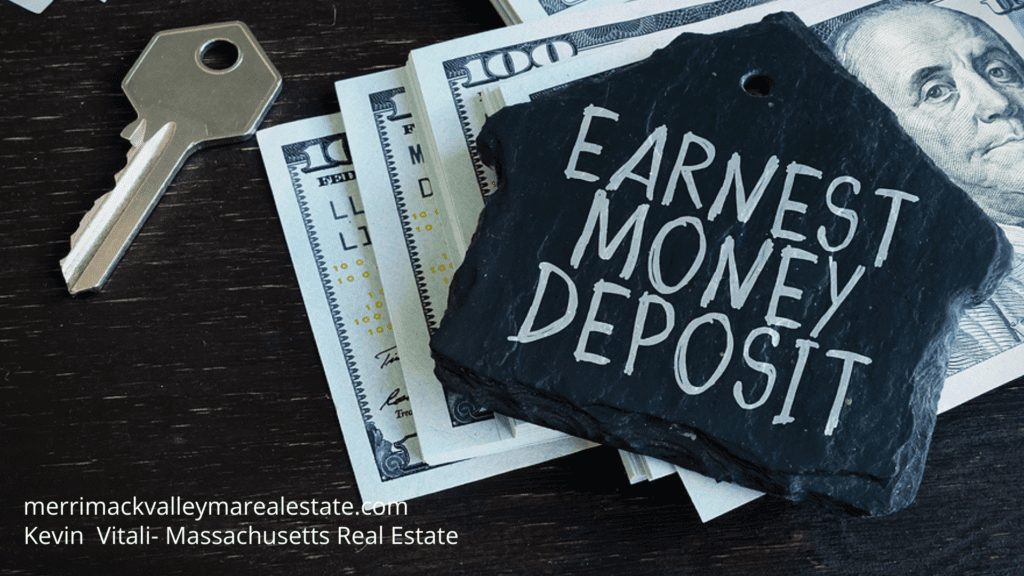 Eventually, when you go about buying a home there will come a time you want to write a contract on a home. And you will run across the term earnest money deposit. Many buyers will think about what is an earnest money deposit and how does earnest money work?
Eventually, when you go about buying a home there will come a time you want to write a contract on a home. And you will run across the term earnest money deposit. Many buyers will think about what is an earnest money deposit and how does earnest money work?
If you have previously bought a home you probably already have an understanding of what an earnest money deposit is and how it works. But as a first time home buyer, it can be very confusing.
Sometimes you will hear the term good faith deposit, home deposit or escrow money as well. They all mean the same thing as earnest money deposit. The terms are often used interchangeably with each other and are essentially the same thing.
Definition of Earnest Money
The earnest money definition is quite simple. Earnest money or good faith deposits are usually submitted with a contract on a home purchase.
It shows you are earnest, or you are serious in mind and the matter is of grave importance to you by willing to have the seller hold a the earnest money during the escrow period on a home.
You are showing the home seller you are willing to put some skin in the game and are acting in good faith by giving earnest money with a contract. Your deposit shows you are serious about buying the seller’s house.
An earnest money deposit also binds a buyer to perform on the contract. If they do not perform based on the terms of a contract, earnest money deposits can be turned over to the seller as damages under certain circumstances as spelled out in your contract. Make sure you have a full understanding of when an earnest money deposit can be refunded to you or turned over as damages to a seller.
The money held in escrow is security for a seller to remove their home from the market while you head to the closing.
Ever hear the expression “show me the money?”
That’s exactly what you are doing with the earnest money you offer to put in escrow. You are showing the seller the money…. and, your seriousness.
Earnest Money vs. Down Payment or a Home Deposit
This part is the confusing part for some home buyers. Your earnest money deposit has nothing to do with your down payment. They are not the same thing. But they are both lumped together as a home deposit.
The confusion comes when your buyer’s agent asks how much you want to “put down” as a good faith or home deposit.
Two Types of Home Deposits
When you think of a home deposit, there are two distinct types to consider
Think of it this way. A down payment is one type of home deposit where money is put toward the purchase price to get approved for the loan. Your down payment that is required to secure the loan has nothing to do with money you put down as good faith with a purchase and sales contract.
The earnest money or good faith deposit is another type of home deposit. It is a showing of good faith or promise to a seller you will perform on a purchase contract. It has nothing to do with your bank financing and the down payment the bank is requiring.
The down payment is to satisfy the bank, earnest money satisfies the seller.
Is Earnest Money Required?
An earnest money home deposit is not required but, it is standard and typical you tender a home deposit to be put in escrow with a contract. You would be doing a disservice to yourself by not carefully considering the deposit you submit with a contract.
An earnest money deposit is important to a seller in contract negotiations. It shows the seller you are serious in your intent to purchase their home. If you are not willing to put down a substantial deposit with a contract, the seller will not take you seriously.
Remember, the seller is taking a risk by signing a contract and promising to sell their home to you. There is typically 30-90 days between accepting an offer and a closing. Meanwhile, they can’t sell their home to anyone else.
But what if you don’t close? The sellers have lost time and more importantly, they may have lost a significant amount of money.
Think About It
If you had your home for sale at $450,000 and you had two offers at the same price. One buyer wasn’t offering any money as an earnest money deposit and another who was offering $22,500 as a good faith deposit, who would you think is more serious?
It goes deeper. The more serious the seller thinks you are, the more willing they may be to make concessions to make a deal work.

How Much Earnest Money Should I Offer With A Contract?
How much earnest money you should offer on a contract varies.
It will depend on where you are in the country, the real estate market you are in and how much money you have.
I can speak to what is typical in Massachusetts.
In the 20 years, I have been in the business, the general practice is the home buyer offers 3-5% of the purchase price as their earnest money deposit to put into escrow. Obviously you want to risk as little money as possible but show the seller you are serious in your intent to purchase.
There may be times where a buyer offers more because they want to show a seller they are very serious. I have seen cash offers where buyers have given a 25% good faith deposit.
On the other hand, I have had VA (Vetran Administration) buyers offer a deposit of 0-1%.
Or, a buyer who has most of their money tied up in a home that they are selling and have less than the typical deposit to put towards a good faith deposit. If you are offering less than what is typical for your market, make sure the seller knows why.
You also should factor in the market conditions. In a hot seller’s market, you want to come in strong with your deposit. In a buyer’s market, you run the show…. and can offer less.
It is up to you the home buyer, how much you want to offer as earnest money to the seller. But, remember, the seller is paying attention, too little and they may not take you seriously.
When Is My Earnest Money Due?
Again that varies region to region about when your earnest money deposit is due. As, a simple rule…. when you sign a contract.
Here in Massachusetts, it is a two contract process. A contract to purchase is signed (or offer) and a small earnest money deposit of $500 to $1000 is tendered with that contract.
Then in about two weeks, a purchase and sales contract is signed and the remaining balance of the earnest money you and your seller agreed to is submitted with the contract.
The amount of the deposit is negotiated by the buyer and seller.
What Happens To My Deposit Money?
Your deposit will be held in an escrow account. It should never be turned over to the seller to control. The terms should be spelled out in the contract of who is holding the earnest money in an escrow account.
An escrow account is managed by an escrow agent. In a real estate transaction, an escrow agent is typically a real estate broker or an attorney
There are legal responsibilities to holding monies in an escrow account and an escrow agent can not arbitrarily disperse the funds without following the terms of the purchase contract.
Your money is safe in an escrow account.
Do I Get My Money Back If I Don’t Close?
Often a buyer will wonder if is earnest money is refundable. Your good faith deposit is refundable under certain terms in your purchase contract.
A contract will have contingencies to protect a homebuyers deposit money.
Contingencies in a real estate contract are where something must happen by a certain date for the sale to occur. If not, the contract can be withdrawn and any monies held in escrow are returned.
A common contingency is a mortgage contingency. A buyer under a mortgage contingency clause is given 30-45 days to secure mortgage commitment. If they do not do so by a certain date, they can withdraw and the contract is null and void with all monies will be returned.
If you buying a home is contingent on another event happening talk to your attorney and make sure a contingency allows you to back out of a contract and have your earnest money refunded if the event does not occur.
Common Contingencies To Consider:
- Mortgage Contingency
- Home Inspection Contingency
- House to Sell Contingency
- House To Appraise Contingency
There Is Some Risk To Your Money
As a home buyer, you must understand there is a small risk of losing your good faith deposit if you fail to perform by the terms agreed to by you and the seller. While contingencies help protect your deposit, they do not cover every scenario.
In your purchase contract, you will be agreeing to forfeit your earnest money deposit if you default on your contract. Meaning you don’t close due to something the home buyer does or fails to do.
So what can happen? You could lose your job just prior to closing but after getting mortgage commitment. You could lose your financing because your credit score dropped. You could get cold feet.
Realize your risk is minimal. All of those scenarios are in your control. Don’t buy a house if your employment is unstable. Don’t alter your credit profile while in your escrow period. Make sure this is the house you want to buy.
Pay attention to contract dates and details. Don’t lose your earnest money on a home over a technicality like a missed date. Your agent representing you should be monitoring critical dates for you.
Work with an attorney on your purchase and sales contract to provide as much protection as you can of your money held in escrow.
What Happens With The Deposit Money At Closing?
An area of confusion from many homebuyers is what happens with the earnest money at closing.
All monies that are held in escrow are applied towards the transaction when the home closes.
For example, if you are buying a $300,000 house. You gave an earnest money deposit of $9000 on the contract and the money you have to bring to closing including down payment and closing costs is $24,000. The $9000 held in escrow would be applied to the $24,000 and you would only bring $15,000 to closing.
If you have an excess deposit, any additional funds over and above what is needed to close is returned to you.
What If There Is A Dispute Over The Escrow Money
Occasionally, a real estate transaction may not close and there will be a dispute over the earnest money put in escrow.
If a dispute arises there are some provisions in your contract. In Massachusetts, the basic contracts say the escrow agent can’t disburse the funds until all parties agree.
The simple solution is all parties should come to terms with what happens to the escrow money and move on.
But in some cases, the buyer and seller can’t agree. The escrow money will either be held by the escrow agent or turned over to the state if not resolved in a timely manner. The funds will only be disbursed after a decision is made by the courts. Meaning one of the parties will have to bring a lawsuit to lay claim to the earnest money deposit.
In many cases, it will be obvious the buyer either defaulted and should turn the earnest money over to the seller as damages. Or, the buyer followed the terms of the contract including contingencies and the seller should release the funds to the home buyer.
And then there are times when a seller defaults and the property doesn’t close. Try to avoid going to court.
Lawyers’ fees will eat up much of the money you may be awarded, to begin with.
Summary
Earnest money is part of the contract negotiations to purchase a home. It should not be taken lightly. The amount you put in escrow gives a seller some security and you are showing them them you are serious by the amount of your earnest money with a contract.
Make sure you fully understand the contracts and how the money is held and handled. By having a good understanding of the contract, it could avoid future issues.
Also, work with an attorney to protect your earnest money deposit that is held with a contract to purchase.
Other Real Estate Related Articles:
- Breaking a real estate contract can be a big deal. Real estate contracts are legal and binding and there can be consequences to breaking a contract. Bill Gassett does an excellent job of explaining the ins and outs of breaking a contract and when your escrow money could be at risk.
- Just about everything is negotiable in a real estate contract. Including how much you give as an earnest money deposit. Paul Sian gives some great negotiating tips for both homebuyers and sellers.
- As a homebuyer in your search for a home, you may run across properties that are pending or contingent. Michelle Gibson explains the difference between homes that are contingent and pending.
- Buying a home can be complex there are many moving pieces to it. Most people don’t buy more than a home or two in a lifetime so it would be difficult to know what home buying mistakes to avoid. Sharon Paxson gives us some advice on avoiding those home buying mistakes,
Kevin Vitali, a Massachusetts Buyer’s Agent, has provided the article, What Is Earnest Money In A Real Estate Transaction? If you are looking to buy a home call Kevin at 978-360-0422.




